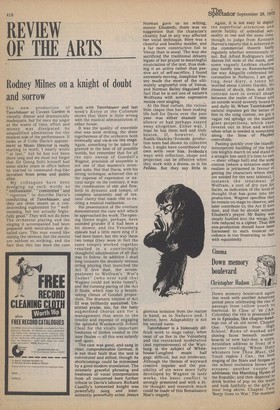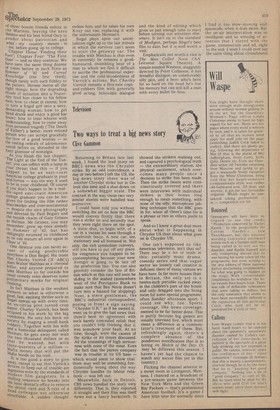Cinema
Down memory boulevard
Christopher Hudson LL
. _ . _
Down memory boulevard again this week with another American period piece celebrating the rite of passage from callow youth to manhood. In Class of '44 ('AA' Columbia) the rite is presented to us in Episodes, like chapter-headings out of an old novel. Chapter One: 'Graduation from High School.' Rows of washed and shining faces beneath mortarboards or new hair-dos; a stern, Arnoldian address in front of a banner reading When DutY whispers low Thou Must, the Youth replies I Can; the loud singing of the Stars and Stripes a! the school orchestra blows aln scrapes; another couple 01' addresses; the Marching Hymn of the Republic; and then dispersal to drink bottles of pop on the stairs and look lustfully at the girls lo their long skirts. Chapter Two: 'Benjy Goes to War.' The meekest Spectator September 29, 1973
of three bosom friends enlists in the Marines, leaving the hero Herrnie and his best friend Oscy to Ponder about patriotism and what my country means to me, before going up to college.
Chapter Three: 'Finding their Feet': Chapter Four: 'The First Date' — and so they continue. We have seen the same thing dozens of times before in such films as Summer of '42 and Carnal Knowledge (the first third), though rarely with such fidelity to the pattern. Hermie learns all the right things: how the degrading rituals of initiation into a FraterMY bind him closer to his fellow Men; how to cheat in exams; how to turn a frigid girl into a sexy, demanding woman; how to get blind drunk and enjoy a good bar brawl; how to treat whores with understanding; how to come away from personal tragedy ('The Death of Father') a better, more refined Person who can accept gracefully the love of a good woman — so the testing ordeals of adolescence unroll before us, shrouded in the hazy glamour of nostalgia. As you finish the last chapter, The Light at the End of the Tunnel,' you can reflect with a lump in Your throat that this — if you happen to be an east-coast American college graduate in your Mid-forties — was the way it used to be in your childhood. Of course if You don't happen to be a middle-aged east-coast American College graduate you can be forgiven for finding the film rather inaccessible and over-sentimental — despite the nice photography and directed by Paul Bogart and the boyish charm of Gary Grimes as Fiermie. Mr Grimes, you may ,Temember, grew up once already 111 Summer of '42, but has Obligingly returned to childhood SO he can mature all over again in Ciass of '44.
One director you can never ac cuse of using predictable storylines is Don Siegel. His latest
film Charley Varrick CX' ABC].) stars Walter Matthau as a criminal killer, and anyone prepared to take Matthau so far outside his usual comedy roles deserves some Preliminary marks for original thinking.
In fact Matthau is the weakest element in what is otherwise a good, fast, exciting thriller such as Siegel comes up with every time. An ex-circus pilot turned crop duster. Charley Varrick, has been
eclipsed in his work by the big combines. He sets his back on society by staging a small bank robbery. Together with his wife and a homicidal delinquent called Herman, he gets away not with the two thousand dollars or so that he wanted, but with three-quarters of a million 1\djafia money that will put the wlafia hoods on his trail.
It is too good a story to give ajway, except to say that Varrick's eevices to keep out of trouble are
Ingenious even by the standards of Modern film gangsters. In a
chilling sequence he breaks into the local dentist's office to remove the dental card and X-rays of a
.aead colleague not otherwise Identiftable. A sudden thought
strikes him, and he takes his own X-ray out too, replacing it with the unfortunate Herman's.
Siegel plays upon our uncertainties right up to the last minute in which the survivor can't seem to start the getaway car. The trouble with Matthau is that even in extremity he remains a goodhumoured, shambling bear of a man to whom we find it difficult to ascribe the professional expertise and the cold-bloodedness of Varrick's actions. But Charley Varrick remains a first-rate copsand-robbers film with generally good acting, believable dialogue and the kind of editing which gives us just enough time to react before turning our attention elsewhere. It isn't up. to the standard of Madigan, perhaps Siegel's best film to date, but it is well worth a visit.
Emphatically not worth a visit is The Man Called Noon ('AA' Leicester Square Theatre). A simple-minded Western, sluggishly directed by Peter CoHinson, it has dreadful dialogue, an unbelievably silly plot, and a hero who's been hit so hard on the head he's lost his memory but can still kill a man with every bullet he fires.











































 Previous page
Previous page